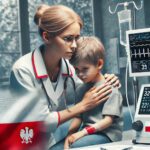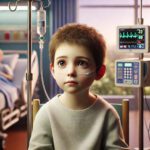Lippe, C. von der; Neteland, I.; Feragen, K.B. Children with a rare congenital genetic disorder: a systematic review of parent experiences. Orphanet Journal of Rare Diseases, v. 17, n. 375, 2022. Disponível em: https://doi.org/10.1186/s13023-022-02525-0. Acesso em: 2/3/2024.
👨👩👧👦 Uma revisão sistemática revela os desafios compartilhados pelos pais de crianças com doenças genéticas raras e destaca estratégias para melhorar sua experiência.
- Por que isso importa: Este estudo sublinha a importância do conhecimento e da coordenação no atendimento à saúde para melhorar o suporte aos pais de crianças com condições raras.
🧠 O que está acontecendo:
- Os pais enfrentam falta de conhecimento no sistema de saúde e na sociedade, resultando em desafios no diagnóstico e tratamento.
- Responsabilidades e desafios: A falta de informação acessível obriga os pais a se tornarem especialistas e defensores das necessidades de seus filhos.
🔍 Nas Entrelinhas:
- A falta de cuidados coordenados e o isolamento social são barreiras significativas.
- Fatores positivos: A empatia e o engajamento dos profissionais de saúde, apoio social e mecanismos de enfrentamento pessoal ajudam os pais a adaptarem-se à situação.
🏃 Resumindo:
- Pais de crianças com doenças raras compartilham experiências comuns de desafios e estratégias de enfrentamento.
- Ações sugeridas: Melhorar a coordenação do cuidado e valorizar o conhecimento dos pais pode aliviar alguns desses desafios.
🖼️ O quadro geral: Este estudo evidencia a necessidade crítica de conhecimento especializado, cuidados coordenados e apoio social para pais enfrentando doenças raras em filhos, chamando a atenção para a importância de estratégias integradas de suporte.
💭 Nossa opinião: A empatia e o apoio são tão cruciais quanto o conhecimento médico no cuidado de doenças raras.
O artigo em perguntas e respostas
Quais são os principais temas em que as conclusões da revisão são categorizadas?
Os resultados da revisão sistemática foram categorizados em três temas principais:
- Experiências dos pais com os cuidados de saúde: Este tema explora como os pais interagem com os serviços de saúde responsáveis pelo cuidado de seus filhos. Os subtemas incluem a falta de conhecimento e experiência dos profissionais de saúde em relação a condições raras, falta de coordenação nos cuidados de saúde e as incertezas em relação ao prognóstico, tratamento e função 18.
- Responsabilidades e desafios: Este tema aborda as responsabilidades que os pais enfrentam ao cuidar de seus filhos com um distúrbio genético raro. Os subtemas incluem a falta de informação e conhecimento na sociedade, mudanças e ajustes na vida cotidiana, pais atuando como coordenadores, defensores e especialistas, e reações emocionais 5.
- Fatores que promovem experiências positivas nos pais: Este tema se concentra nos fatores que contribuem para uma adaptação positiva dos pais de crianças com condições raras. Os subtemas incluem profissionais de saúde engajados e compreensivos, benefícios do apoio social e fatores protetores e mecanismos de enfrentamento 2.
Por que é necessária uma abordagem mais holística no acompanhamento de crianças com doenças genéticas raras, de acordo com a conclusão da revisão?
Uma abordagem mais holística no acompanhamento de crianças com distúrbios genéticos raros é considerada necessária de acordo com a conclusão da revisão por várias razões:
- Desafios Comuns: A revisão demonstra que os pais de crianças com distúrbios genéticos raros enfrentam muitos desafios comuns em diferentes condições. Uma abordagem holística pode abordar esses desafios compartilhados de forma eficaz 18.
- Falta de Conhecimento dos Profissionais de Saúde: A falta de conhecimento dos profissionais de saúde é identificada como um grande obstáculo para os pais no cuidado de seus filhos. Uma abordagem holística pode ajudar os profissionais a otimizar suas interações com as famílias apesar das incertezas e da falta de conhecimento 18.
- Cuidados Coordenados: Há uma necessidade de cuidados mais coordenados para crianças com distúrbios raros. Uma abordagem holística pode garantir que os cuidados prestados sejam abrangentes, integrados e adaptados às necessidades específicas de cada criança e sua família 18.
- Valorização da Expertise dos Pais: A expertise dos pais em gerenciar o distúrbio raro de seus filhos deve ser valorizada. Uma abordagem holística pode envolver os pais como parceiros ativos no processo de cuidados, reconhecendo e utilizando seu conhecimento e experiências 18.
- Colaboração Internacional: Desenvolver mais colaboração internacional em pesquisa, diagnóstico e fornecimento de informações precisas e compreensíveis tanto para profissionais de saúde quanto para leigos é essencial. Uma abordagem holística pode facilitar essa colaboração e compartilhamento de conhecimento para melhorar os resultados dos cuidados para crianças com distúrbios genéticos raros 18.
Quantos estudos qualitativos foram incluídos na revisão sistemática e que período de tempo abrangeram?
A revisão sistemática incluiu um total de 33 artigos qualitativos 5. Esses estudos abrangeram uma ampla gama de diagnósticos e condições raras, fornecendo uma visão abrangente das experiências dos pais ao ter um filho com um distúrbio genético raro 5. O período de tempo desses estudos não foi explicitamente mencionado nos trechos fornecidos.
Lippe, C. von der; Neteland, I.; Feragen, K.B. Children with a rare congenital genetic disorder: a systematic review of parent experiences. Orphanet Journal of Rare Diseases, v. 17, n. 375, 2022. Disponível em: https://doi.org/10.1186/s13023-022-02525-0. Acesso em: 2/3/2024.






